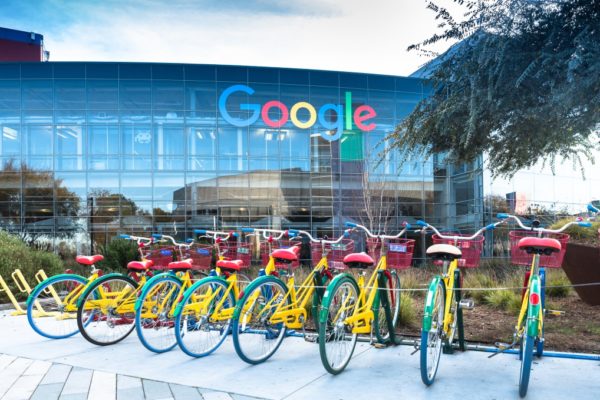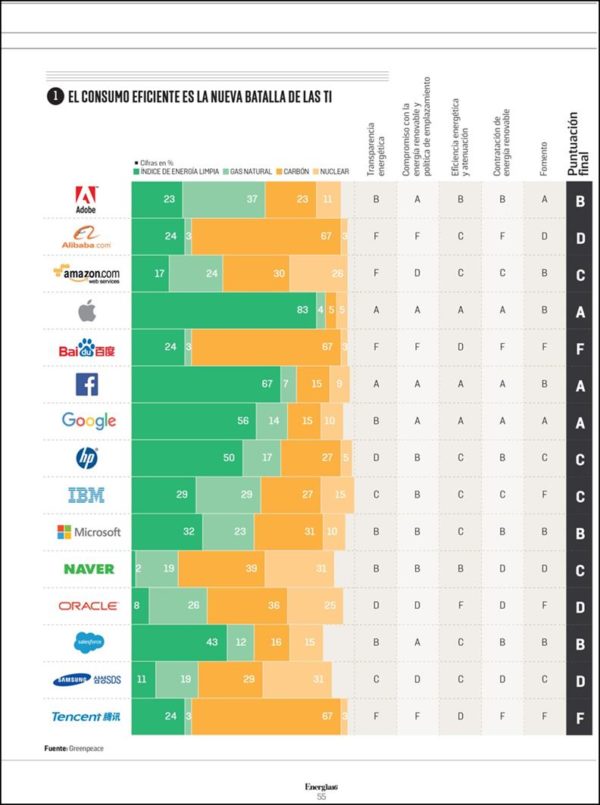admin | 16/10/2018
Large Silicon Vally tech companies are currently making a clear commitment to transitioning toward a greener way of powering their infrastructure, leading to a race to build an Internet with renewable resources.
The Internet has become the central nervous system of the modern global economy. But manufacturing and powering all the devices, data centers, and infrastructure required to keep our digital world online requires a huge amount of energy.
The energy footprint of the Information Technology (IT) industry is estimated to consume approximately 7% of the world’s electricity. Meanwhile, that number is expected to grow even further, as current projections forecast Internet traffic will triple worldwide by 2020.
The way that the world’s digital infrastructure is built and powered therefore poses a dilemma of whether the industry will be capable of undergoing a transition to renewable energy for the sake of sustainable production.
In fact, if data centers and other digital infrastructure were powered by 100% renewable energy, the growing dependency on the Internet could help accelerate the transition to a renewable power economy.
A number of organizations, mainly ecological ones, have challenged the energy efficiency of the IT industry, mainly the leading architects and operators of the Internet, to commit to powering their fast growth with 100% renewable energy.
The result of this was a significantly higher priority given to renewable energy on the part of some of the largest Internet companies.
The energy footprint of the Information Technology (IT) industry is estimated to consume approximately 7% of the world’s electricity
The Pioneers / Tech Goes Green

Large Silicon Valley tech companies seem to currently be committing to a transition toward a green way of powering their infrastructure.
The race to build an Internet with renewable resources began with the leaders of digital platforms like Facebook, Apple, and Google, which were the first to commit to being powered by 100% renewable energy four years ago.
Close to 20 companies subsequently joined in the effort, including international cloud and housing companies, launching a race to build an Internet powered by renewables.

A few years ago Google purchased 842 MW of renewable energy for its data centers around the world in order to ensure that all of its operations were run on clean energy.
Those 842 MW came from a wide range of locations and technologies, from a wind farm in Sweden to a solar power plant in Chile, and they power the company’s data centers around the world.
That is how Google uses less energy than one wash cycle on a washing machine to provide users with uninterrupted YouTube service for three weeks.
If data centers and other digital infrastructure were powered by 100% renewable energy, the growing dependency on the Internet would help accelerate the transition to a renewable power economy
The company has invested 2.5 billion dollars in large-scale renewable energy projects.
In 2007 the tech giant also patented a data center system located on offshore barges that would get energy from the power of the waves.
Apple also invested 745 million euros in an enormous new solar power plant to power its headquarters in Cupertino, California, 52 of its West Coast stores, and to generate an energy surplus to be used to by 60,000 homes. Apple has a number of solar power farms that respond to the needs of cloud technology.
All of the synchronized data handled by iCloud; Internet-enabled programs; music and photo storage; music, video, and app downloads, and all kinds of documents require a huge amount of energy that is supplied by gigantic data centers.

Apple’s data center in Maiden, North Carolina was planned from the start to use renewable energy. Other data centers like the one in Prineville are based on energy sustainability, but in the latter case, with a miniature hydraulic system that takes advantage of the power of water moving through the area’s irrigation channels.
Microsoft, Yahoo, and Amazon are also committed to renewable energy, because in addition to being a politically correct move, it is financially profitable. Additionally, in this way corporations can control and project their costs, from investment to maintenance, allowing them to set the price per kilowatt/hour and estimate annual electricity costs.





